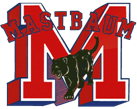Mathematics
We are building habits of mind and attending to details. We are living by the numbers and striving to express ourselves elegantly. We are all engaged in math, making connections and communicating in meaningful ways.
Mathematics is a tool, a language, a weapon, an art, a mystery and a revealer of mysteries. It’s the foundation underlying science, technology, engineering, medicine, military, business, even fashion and entertainment. Think about it – without properly sequenced 1’s and 0’s, correctly correlated equations, precise measures dictating careful construction, your phone would be just cheap bits of plastic and metal fused together. Why does it cost so much? Because you’ve got to pay the number crunchers.
We’ll teach you a little bit. Just basics that sometimes may seem so very complex. The toughest days will be more bearable, even enjoyable, if you view mathematics as a challenge rather than a chore, a game, a puzzle, a journey. Right answers are cool, but what the Math Department really wants to see is authentic effort, focus on the task at hand, perseverance, creative thought, development of logical reasoning, clear communication, thorough explanation, and fearless questioning.
Contrary to the popular intimidating myth, it’s “the smart kids” who ask the most questions. (Top secret: it’s not smartness that makes them ask the questions… it’s the asking of questions that leads to smartness). High school math is hard, even frustrating sometimes. That’s okay. Ask questions. Persist in problem solving. Give us the best you’ve got each day.
2020-21 Course Offerings
Algebra 1
Algebra 1 courses include the study of properties and operations of the real number system; evaluating rational algebraic expressions; solving and graphing first degree equations and inequalities; translating word problems into equations; operations with and factoring of polynomials; and solving simple quadratic equations.
Geometry
Geometry courses, emphasizing an abstract, formal approach to the study of geometry, typically include topics such as properties of plane and solid figures; deductive methods of reasoning and use of logic; geometry as an axiomatic system including the study of postulates, theorems, and formal proofs; concepts of congruence, similarity, parallelism, perpendicularity, and proportion; and rules of angle measurement in triangles.
Algebra 2
Algebra 2 course topics typically include field properties and theorems; set theory; operations with rational and irrational expressions; factoring of rational expressions; in-depth study of linear equations and inequalities; quadratic equations; solving systems of linear and quadratic equations; graphing of constant, linear, and quadratic equations; properties of higher degree equations; and operations with rational and irrational exponents.
Computer Science (Discoveries & AP Principles)
Introduces students to the breadth of the field of computer science. In this course, students will learn to design and evaluate solutions and to apply computer science to solve problems through the development of algorithms and programs. They will incorporate abstraction into programs and use data to discover new knowledge. Students will also explain how computing innovations and computing systems, including the Internet, work, explore their potential impacts, and contribute to a computing culture that is collaborative and ethical.
AP Principles students will be taking the AP exam and will be dual enrolled in Harrisburg University for the potential of earning 4 college credits.
Department Chair: Ms. Jaime Higgins
Teachers:
- Ms. Samantha Fruit
- Mr. Bhoke Lumumba
- Mr. Andrew Thomas (YouTube)
- Mr. Joseph Wexler
